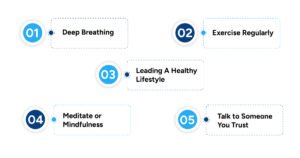Stress Medication plays a huge role in improving the effects of stress and anxiety among people. These medications work by balancing the neurotransmitters responsible for mood by making a patient feel calm and at a steady state emotionally. The medication can be an important part of a wider treatment system.
Furthermore, it contains therapy, lifestyle changes, and self-care activities, as well as long-term or unwavering stress. It can alleviate those whose lives are distorted by a feeling of tension that runs through the day to enable them to cope further and live a less hectic life. Stay with us till the end and get more valuable insights!
Medication For Stress and Anger
Anger and stress medication can help people in the sense that the individuals feel unburdened by not feeling controlled. It may cause hindrance to regular living, job, and relations due to stress and anger. Similarly, a physician can prescribe medications, such as Xanax, Lexapro, or Prozac, because they will calm down the stressed individual and help him lead a happier life. These medicines are effective because they help balance the chemicals of the brain in ways that reduce anxiety and temper tantrums.
In addition, your physician might also prescribe Zoloft or Wellbutrin to treat anger problems. These can help maintain proper control over mood swings and limit the anger outbursts to a minimum, and overall health of the mind. Therefore, anger and stress medication can also be effective only when the supervision of a doctor is present. The body of each person reacts differently, and as a consequence, the amount and the kind of medication for stress prescribed vary depending on the body’s needs.
Symptoms of Stress
The following are some of the typical symptoms of stress:
- Migraines or stiff shoulders
- Sleep issues or insomnia
- Having that 100 percent nervousness or distress
- Irritability or changes of mood that are sudden
- Problems with gluing or remembering things
- Stomach ache or tummy upset
- Fast breathing or an increased heart rate
- Sensing overloaded or inadequate to cope
Symptoms of Stress in Women
The following are some of the typical signs of stress in women:
- Migraines or headaches
- Loss of hair or skin disorders
- Poor sleep or disturbed nights
- Moodiness, angry, or quick to cry
- Loss of energy and fatigue
- Irregular menstruation or periods
- Worrying or worry, fear, or anxiety
- Alteration in the appetite or weight
List of Best Stress Relief Medicines
Most of the richly prescribed best medications for stress (use always on the recommendation of a doctor):
- Xanax (Alprazolam) – used as a short-term measure of relieving stress and anxiety
- Lexapro (Escitalopram) is used to treat stress, anxiety, and depression
- Prozac (Fluoxetine) – enhances the mood and calms down the symptoms of stress
- Zoloft (Sertraline) -suppresses long-term stress and anxiety
- Buspar (Buspirone) – to control stress and generalized anxiety
- Ativan (Lorazepam) -for instant relief in cases of extreme stress
- Valium (Diazepam) -muscle relaxing, anxiety-related tension
How To Manage Stress and Anxiety?

1.Deep Breathing
Slow breathing calms the cardiovascular system and, coupled with breathing exercises, reduces body tension. You can have practice in this by breathing slowly through the nostrils, retaining it by counting by twenties, and expelling again slowly through the mouth. You can perform the exercise at any place and at any time you are anxious or stressed. In the long term, it also makes your body react to stressful events more calmly.
2.Exercise Regularly
Endorphins, the natural chemicals released in exercise, make one happy and low in anxiety levels as well. Exercising also reduces the stress hormone- cortisol, leaving you relaxed. Aerobic exercise such as walking, yoga, jogging, or dancing can be useful to burnout stress. Create time to do physical activities for at least 30 minutes per day on most days.
3.Leading A Healthy Lifestyle
The level of stress and anxiety is well addressed by eating a healthy diet and sleeping. Cut the caffeine and sugary food compounds- these contribute to jitters. Drink loads of water and healthy, nutritious meals and food that give you energy throughout the day. Sleep about 7-9 hours and have good sleep at night so that the mind and the body can rest.
4.Meditate or Mindfulness
Mindfulness and meditation will play a role in aiding you to live in the here and now rather than living in the past and the future. The exercises soothe your mind and reduce stress, and improve emotional stability. The best start is to do 5 minutes of mindful breathing or a guided meditation practice daily. In long-term mindfulness practice, it causes a greater sense of self-knowledge, resulting in a more positive reaction to hardship or setback.
5. Talk to Someone You Trust
It can be very healing to share your thoughts and feelings with a person you trust or a family member, or a therapist. This is because talking will help relieve the emotional load, and it helps provide a fresh outlook. You can also get solutions to coping strategies offered by a mental health professional. When other people support you, it makes you feel like you are not in the struggle alone.
How To Relieve Stress Quickly?
Calming your body and mind is the first method of relieving stress quickly; the process involves slow and deep breathing. This is effective in reducing your heartbeat rate and in making you more relaxed almost immediately. The stress can also be removed by taking a break by stepping out of the situation where one feels stressed. Listening to some soft music, stretching, or having a glass of water are also helpful in making a person better almost immediately. These little things help relax your mind and be more rational.
Moreover, the other simple stress relief tip is to exercise or flex your muscles, even for a limited period. Some physical activity, or even simply a walk or dancing to your favorite song, will help to improve your mood and wash away the tension. Being able to speak with someone you have confidence in can likewise help you vent and get a new point of view. Thus, these are fast techniques that will enable you to feel relaxed and in control in a short time.
Stress Treatment Options
1.Counselling for Stress
Counselling on stress entails exploring with a trained therapist to give the individual comprehension of the origins of their stress. Guided conversations will allow you to clear your mind, discuss feelings, and define what you usually do in dealing with them. The therapist visits practical approaches to better handling difficulties. Counselling could take place face-to-face or online to make it convenient. With time, it assists in balancing emotions and the rest of mental health.
2.Stress Test Medication
A stress test medication refers to the use of a drug to induce a medical stress test to determine how your heart will react under pressure. Where an individual is unable to tolerate the test, physicians may administer some medicines used to simulate the effects of exercise. It is a moderate and safe sort of process performed under medical attention. The findings can be used in continuing treatment or making life modifications to limit the stress effects on health risks.
3.Anti-Stress Medication
Medication to help soothe stress is prescribed to ease stress, anxiety, and restlessness. This would be based on the kind of stress that is causing it, and this could be antidepressants, anti-anxiety medications, or even beta-blockers. Likewise, it is designed to calm the mind and regulate the mood such that one can manage them better. They are used along with therapy or lifestyle change in the majority of cases to yield better results.
4.Chronic Stress Medication
Chronic stress medication involves the use of medication when stress is constant and affects day-to-day activities severely. These drugs assist in the regulation of brain chemicals, which are associated with moods and reactions to stress. They can be combined with SSRIs and SNRIs or other medications prescribed to minimize symptoms of long-term stress. Periodic interactions with a medical practitioner should be done to check for improvements and adverse effects. This treatment, in conjunction with good health practices and treatment can make a significant difference in quality of life.
Bottom Line
Medications to treat stress may help such stressful indicators as persistent worrying, tension in supporting muscles, and problematic sleep, to make you feel more settled and concentrated. They do this by normalizing brain chemicals that determine mood and reaction to stress. This can improve your response to daily life and improve productivity, as well as aid emotional well-being.
Ultimately, stress medications also assist in preventing physical problems with health that occur because of stress, high blood pressure, or heart problems in some people. To achieve the utmost results and understand how to utilize stress medications safely and effectively, you can refer to Mental Behavioral as a reliable source of information.
FAQs
What are the medications for stress?
Stress medications will consist of prescription medications that will help control stress-related symptoms, including irritability, anxiety, and sleeping difficulties. They act by balancing the brain chemicals that control mood and obtain rest.
When can I take stress medication?
Stress medication needs to be considered when stress is hindering your life, work, or relationships, and lifestyle changes are not adequate. It is best to consult a healthcare provider before using any medication.
Are medications against stress safe?
Many stress medications are safe to use as directed, but they can have side effects. Your doctor will select the most appropriate one, depending on your health and requirements.
Do stress medications work at once?
Others may bring relief in hours or days, whereas some others, such as antidepressants, may take several weeks to have full effects. It is important to be patient and use it as regularly recommended.






